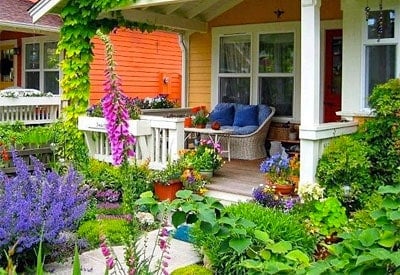The press is fascinated with stories about communities that go after front yard gardeners. Some areas have covenants or (worse) laws making gardening in one’s front yard a no-no. These often are affluent enclaves where investment-minded owners are nervous about protecting their property values. But not all. Sometimes regular communities, in a freedom-quashing pursuit of conformity, will take up the cause; as if front yard gardens might hurt the price of real estate.
The most recent article is this long look from The New York Times. Time magazine got in on the action last year. According to them, it’s all about “meddling local officials gone off the deep end” and the relative value of all that, care-intensive grass (vs. something you can eat) grown for the questionable purpose of keeping up appearances.

#1 PLANT FOOD
Organic Fish & Seaweed (2-3-1)
Use on a regular basis for bigger crops, increased sugars and better blooms.
Learn moreUsing the right gardening products makes growing vegetables easier, more successful and enjoyable! At Planet Natural we stock everything you need – seeds, soils and fertilizers — to make your garden (front or back) the envy of the neighborhood!
Of course, this isn’t an issue in every community. While living long ago in anything-goes Venice, California, we grew tomatoes, peppers, basil and squash in hardly-raised beds as well as lettuce and other greens along the path that led to our front door. This was on a walk street, a lane where the houses didn’t face a street but only a sidewalk, and we weren’t the only ones growing vegetables out our front door. One of the neighbors on the same block had rabbits whose cages he moved around to fertilize different areas. Sometimes when he was out there, the rabbits were free to fertilize wherever they pleased.
Many of the yards had tall privacy fences but ours was waist high. We often came out to see neighbors hanging over the fence admiring our ripening tomatoes and the lush greens that lined our walk. We otherwise might have never even met our neighbors, let alone hold meaningful conversations with them. (Since our long-ago leaving, the neighborhood has gentrified quite a bit but I can’t help believe that residents would still tolerate vegetables growing in the front yards.)
The last big case of this sort to gain major coverage was that of a Michigan woman who had four neat, raised beds in her front yard. Maybe it was the fact that she might have gone to jail for growing lettuce (the story had a mostly happy ending). The most recent case comes from Orlando, Florida where city code require a front yard to have a “finished appearance.” But, of course, these problems have a long history.

Now there’s nothing wrong with lawns when properly grown. They are great places for kids to play, dogs to roam or having picnics. But you don’t want your kids rolling in grass that’s been doused with fertilizer and herbicides. And, as anyone who reads the utility bill knows, they can be a major sink hole for water. But the issue here isn’t about demonizing grass. It’s about the right to grow something healthful and valuable on your own property. Check out the arguments in this fine article from the San Francisco Chronicle about replacing your “useless” lawn with an organic vegetable garden. What’s said here is especially appropriate for those urban dwellers who don’t have much yard — front or back — to start with.
To some of us, a well-kept vegetable garden is a thing of beauty. And in these times of pesticide-laden produce and GMO food crops, the right to grow your own food is important to many families. Isn’t it time we let common sense prevail and let those who want to, use their front yards — as well as their back — for growing food?











